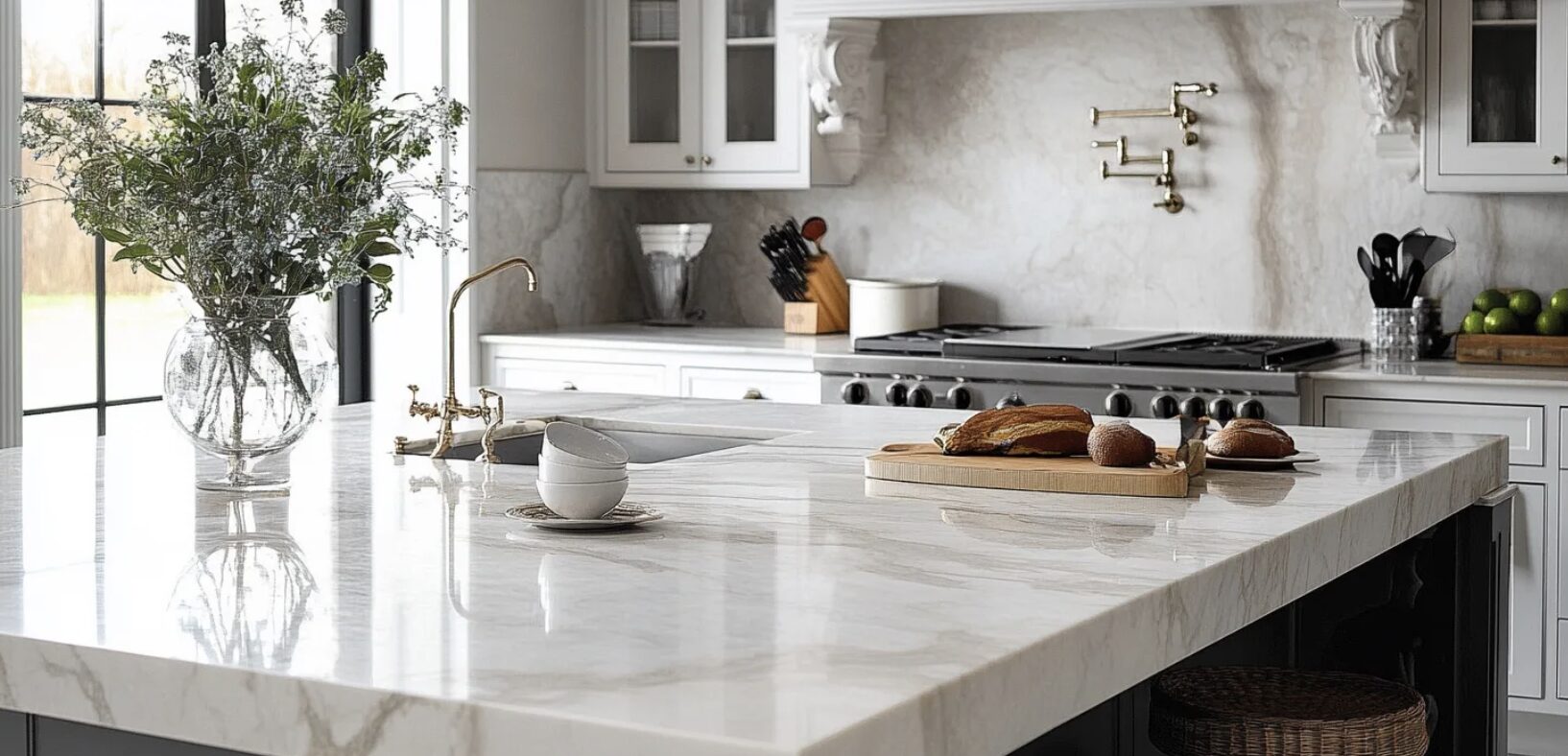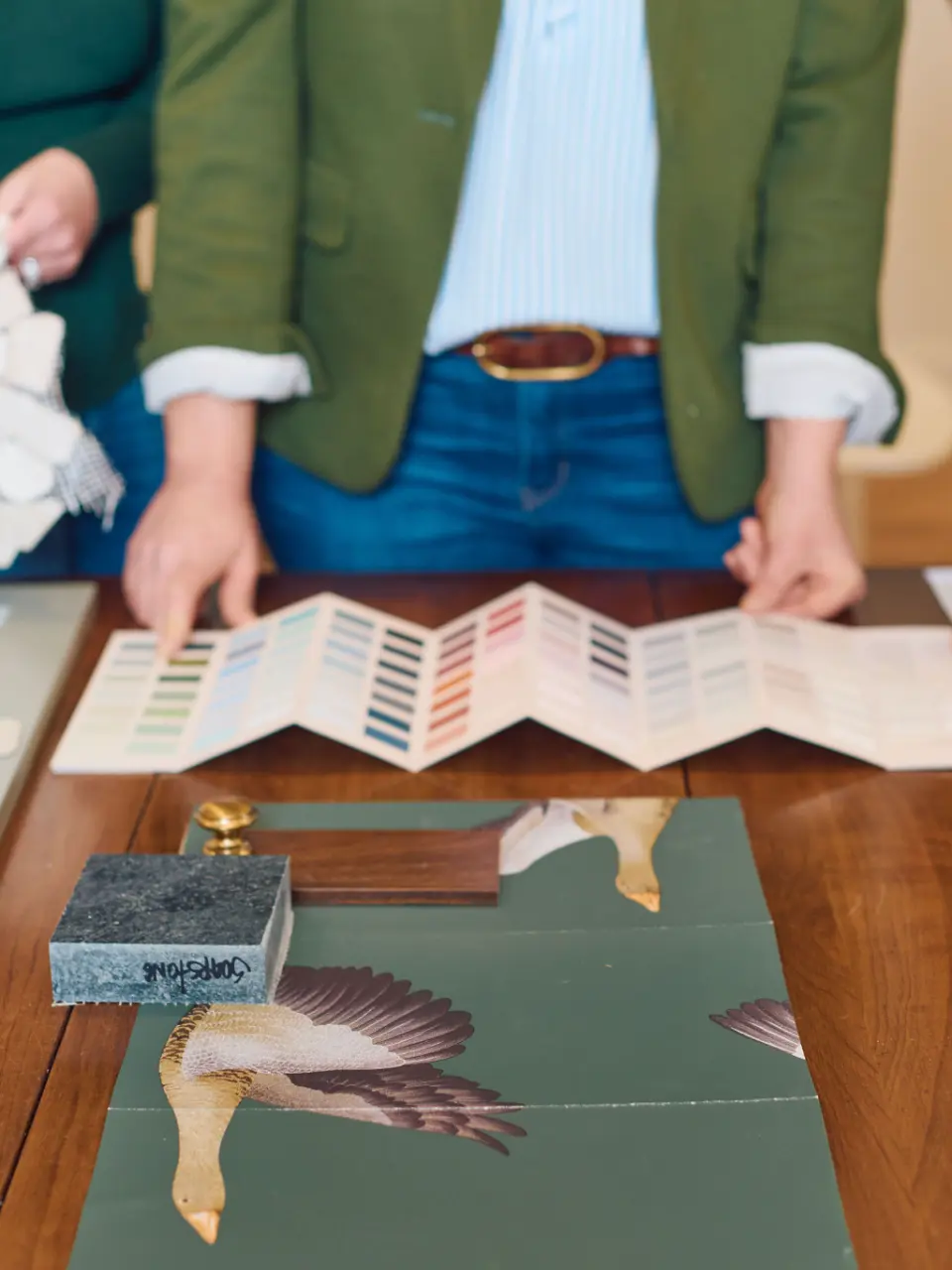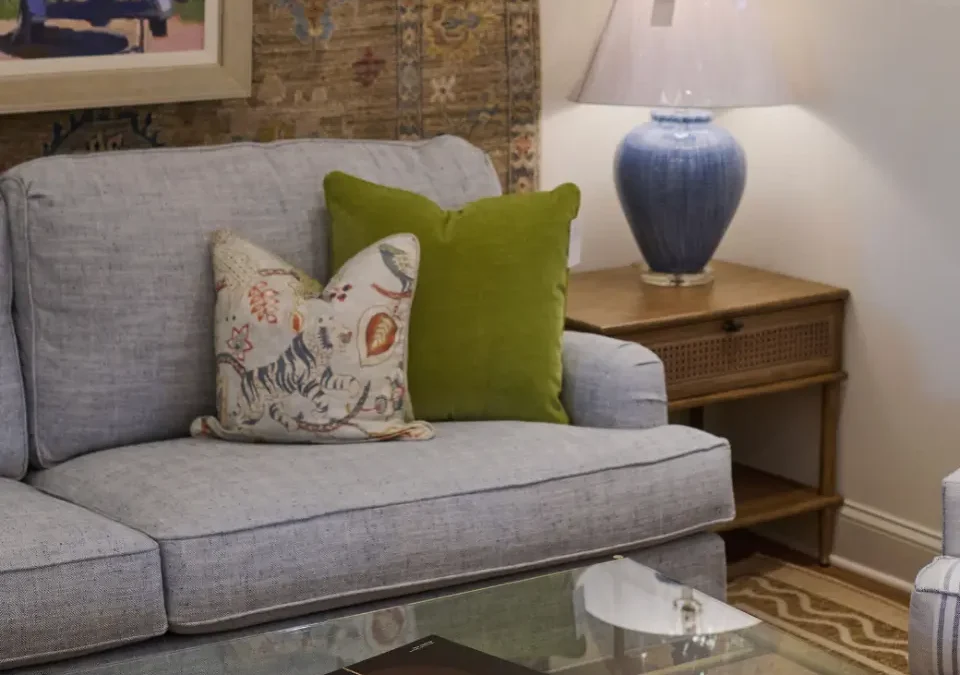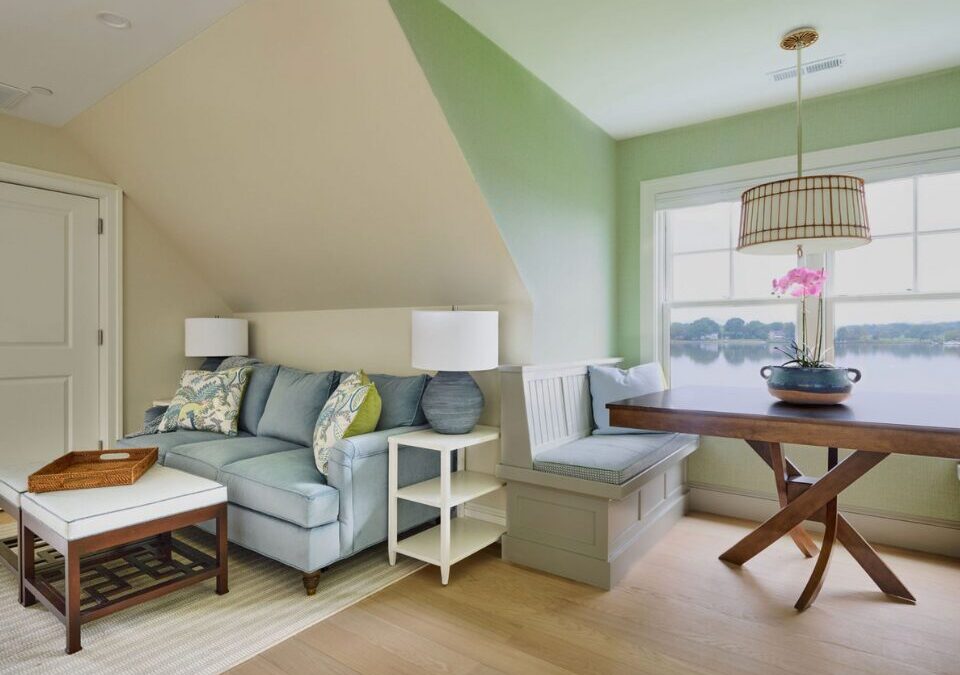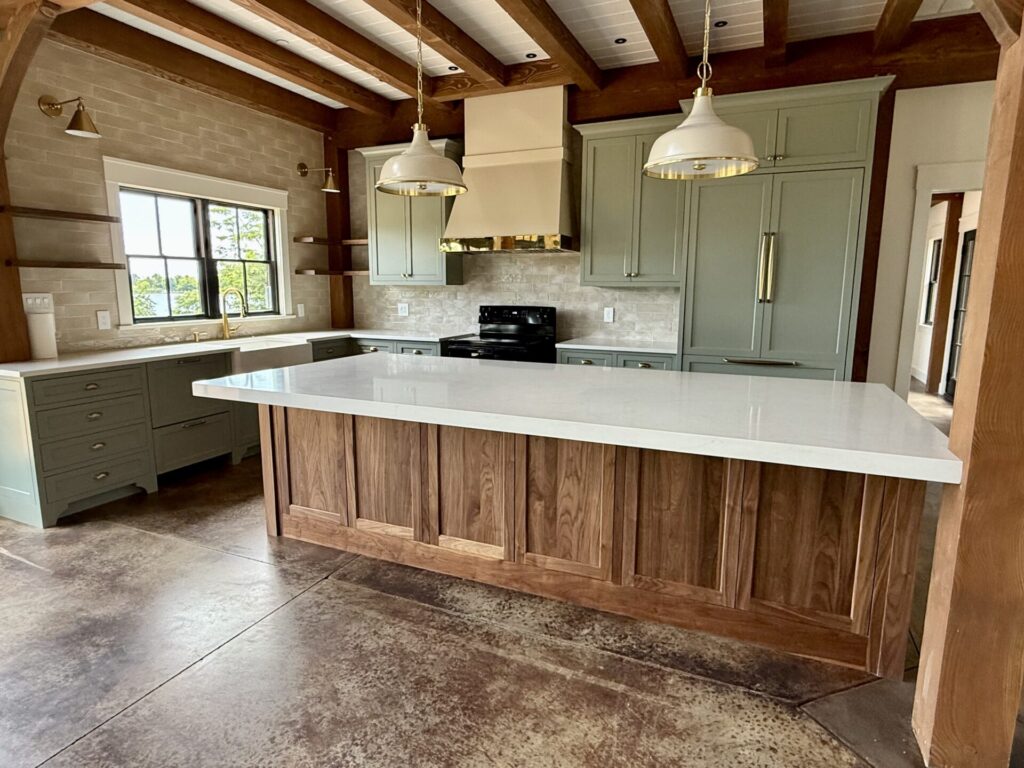
When you’re designing a new kitchen or planning a renovation, countertops are one of the most impactful decisions you’ll make. They define the look of your space, influence how you use it day to day, and—since they’re a significant investment—need to hold up beautifully over time.
At Common Thread Interiors, we guide our clients through this important decision by first helping them narrow down the big question: engineered surfaces like quartz or natural stone options like quartzite, marble, granite, or soapstone?
Quartz vs. Quartzite: Pros, Cons, & Cost
Quartz Countertops:
- An engineered surface, quartz is non-porous, highly durable, and doesn’t need sealing. It resists stains and scratches, making it ideal for families who cook often.
- It also comes in a wide range of patterns—from marble lookalikes to bold solids.
- COST: Typically $75–$120 per square foot installed, depending on brand and finish.
Quartzite Countertops:
- A natural stone often mistaken for marble, quartzite has the beauty of veining with the durability of one of the hardest stones.
- With regular sealing, it holds up wonderfully in kitchens and baths.
- Cost: Typically $95–$150+ per square foot installed; rare slabs or exotic patterns may be higher.
Quartz Levels: Breaking Down the Costs
Quartz pricing is organized into levels (1–5), but don’t be fooled—strength and durability are the same across all levels.
What changes is the rarity and complexity of the pattern, veining, and brand. Of course this pricing is just ballpark estimates. Work with a fabricator or contractor for more specific pricing. Sink cut outs and edge detail choices do impact price choices.
- Level 1: Simple solids and subtle patterns | $55–$70/sq ft
- Level 2: More movement and variation | $65–$85/sq ft
- Level 3: Mid-range, marble-like designs | $75–$100/sq ft
- Level 4: Premium dramatic veining | $95–$120/sq ft
- Level 5: Luxury slabs, exclusive designs | $120–$150+/sq ft
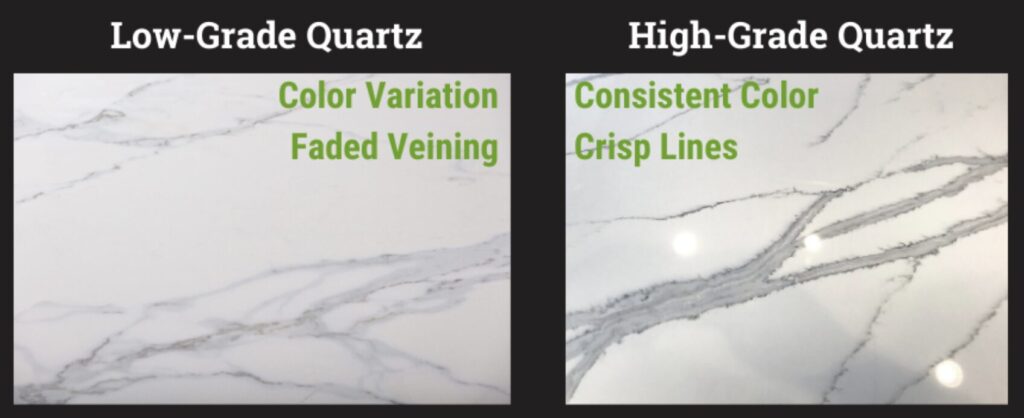
Natural Stone Countertops: Beauty with Personality
Marble Countertops:
- Look: Classic, elegant, and timeless.
- Durability: Softer and and porous; will etch/stain over time
- Maintenance: Needs sealing; patina develops with age
- Cost: $70–$130+/sq ft installed
Soapstone Countertops:
- Look: Smooth, matte, velvety finish
- Durability: Naturally non-porous but soft; scratches easily
- Maintenance: Darkens over time; often enhanced with mineral oil
- Cost: $85–$125/sq ft installed.
Granite Countertops:
- Look: Wide variety of patterns and colors
- Durability: Very durable and heat resistant
- Maintenance: Needs periodic sealing
- Cost: $55–$200+/sq ft installed, depending on rarity.
| Material | Durability | Maintenance | Approx. Cost (Installed) | Style Notes |
| Quartz | EXCELLENT- Highly resistant to stains and scratches | LOW- no sealing required | $75-$125/ sq foot | Wide range of colors; consistent patterns |
| Quartzite | EXCELLENT- Very hard, requires sealing | MODERATE- needs periodic sealing | $95-$150+/ sq foot | Natural veining; looks like marble |
| Marble | MODERATE- Soft; prone to staining/etching | HIGH- Needs regular sealing; Accepts patina | $75-$125/ sq foot | Classic, elegant, develops patina |
| Soapstone | GOOD- Durable; Scratches, but patinas over time | LOW- oiling optional, but no sealing required | $85-$125/ sq foot | Rich feel with dark tones |
| Granite | VERY GOOD- Durable; resistant with sealing | MODERATE- Sealing recommended | $65-$200+/ sq foot | Varied colors, patterns, timeless |
| Limestone | FAIR- Soft; scratches and stains easily | HIGH- Regular sealing and care needed | $65-$100/ sq foot | Soft, Organic, light tones with warmth |
| Travertine | FAIR- Porous; requires sealing and care | HIGH- Sealing needed, more delicate | $60-$100/ sq foot | Warm, rustic texture |
| Slate | GOOD- Durable; resistant, but can chip at the edges | LOW- Minimal maintenance, sealing optional | $65-$100/ sq foot | Dark; Matte, timeless, natural, understated |
How to Choose the Right Countertop for Your Lifestyle
Your choice often comes down to lifestyle and design goals:
- Want ultra-durable and low-maintenance? Quartz or quartzite will serve you best.
- Love organic character and a surface that evolves with use? Marble, soapstone, or limestone may speak to you.
- Looking for timelessness with lots of variety? Granite or slate could be the right fit.
We often mix materials to strike a balance—using quartz on hardworking perimeter counters and a natural stone like marble or soapstone on a statement island. And if there’s a stone you’ve been dreaming about that might require more TLC than your day-to-day kitchen can handle, consider featuring it in a powder room. With lighter use, it’s the perfect spot to enjoy something unique and beautiful without the stress of constant maintenance.
Don’t Forget the Details: Edges Matter Too
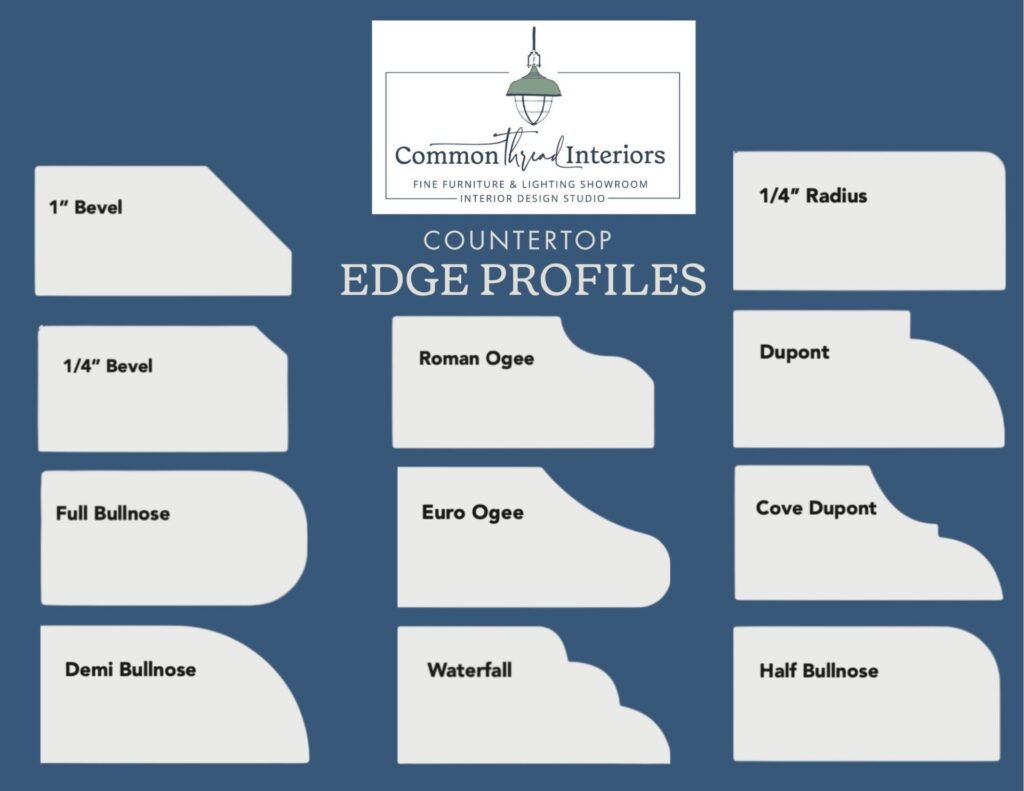
While the stone itself is the star of the show, the edge profile you choose can completely change the look and feel of your countertops. From a simple eased edge to a dramatic waterfall, these finishing details bring personality and polish to your project.
Since edges deserve a spotlight all their own, we’ll be dedicating our October blog post to exploring the many edge profile options—how they impact style, function, and cost—so stay tuned!
Our Takeaway
Countertops aren’t just a surface; they’re a reflection of how you live. Whether you choose engineered quartz, the natural strength of quartzite, or the unique character of stones like marble, granite, or soapstone, the most important factor is selecting a material that feels authentic to you—and that you’ll love for years to come.
Need help choosing the perfect countertop for your kitchen renovation project? Contact Common Thread Interiors for expert, personalized guidance today.
Frequently Asked Questions About Countertops:
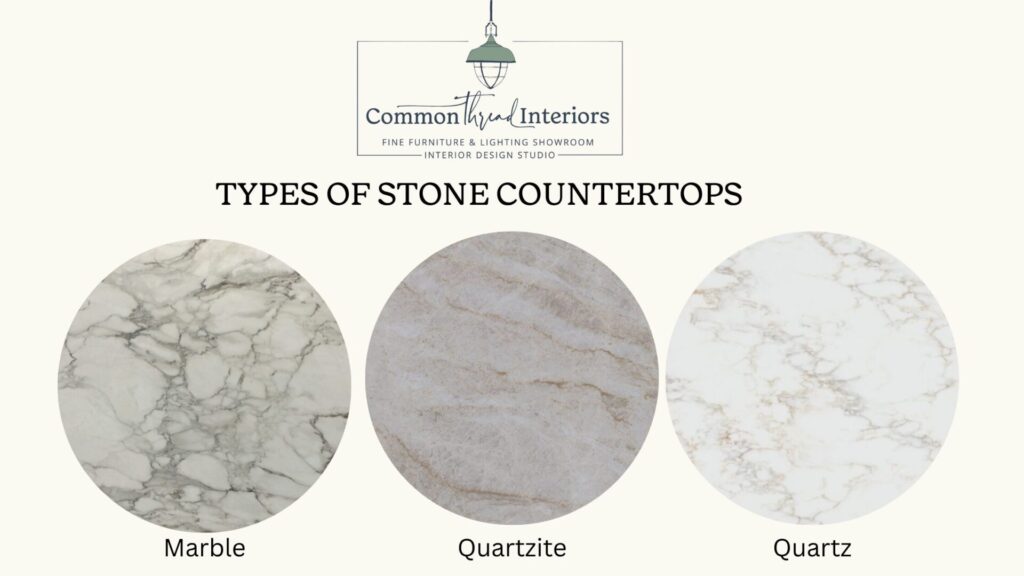
What is the most durable kitchen countertop material?
Quartz and quartzite are both excellent choices for durability. Quartz is non-porous and resists stains and scratches, while quartzite is a natural stone that’s harder than granite.
Does quartz need to be sealed?
No. Unlike natural stone, quartz is non-porous and does not require sealing, making it a low-maintenance option for busy kitchens.
Can I mix different countertop materials in one kitchen?
Yes! Many homeowners mix materials to balance durability and aesthetics—for example, using quartz on perimeter counters and marble or soapstone on a statement island.
What affects the cost of a countertop installation?
Several factors affect cost: material selection, pattern complexity, edge profiles, sink cutouts, and local labor rates. Always get a detailed quote from a local fabricator.
What is the difference between quartz and quartzite?
Quartz is an engineered material made from crushed stone and resin, offering uniform patterns and low maintenance. Quartzite is a natural stone with unique veining and high durability, but it requires sealing.

